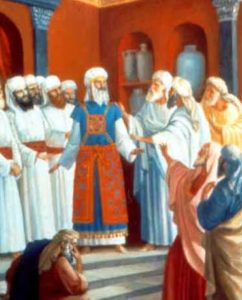
Kohanim and Kohen Gadol
At the beginning of this week’s parasha, Emor, we learn of the various requirements and obligations placed upon the priestly class of kohanim. For the high priest in particular, he must marry only a virgin (Leviticus 21:13). The Talmud asks a perplexing question on this law: is a kohen gadol allowed to marry a virgin who is pregnant? (Chagigah 14b-15a) At first glance, the question seems silly and irrelevant, for how could a virgin ever be pregnant? However, when placed in context, the question has major theological significance.
The question of the pregnant virgin appears in the Talmud (Chagigah 14b-15a) immediately after the story of the four Sages who ascended to the Heavenly realms, Pardes. It was posed specifically to Shimon ben Zoma, one of those four mystics, upon his return. To understand it, we must remember that the Pardes event took place some time in the first third of the second century CE. This was an era when Christianity was already spreading rapidly and, as discussed in depth before, one of Ben Zoma’s contemporaries that went to Pardes with him, Elisha ben Avuya, subsequently became a Christian! Of the four that went up, Shimon ben Azzai never came back, Elisha ben Avuya became a Christian, while Rabbi Akiva became fiercely anti-Christian (as explored in the Apocrypha series of classes). So, the question of the pregnant virgin fittingly went to the neutral Ben Zoma—what did he think about the possibility of an “immaculate” conception? Continue reading
